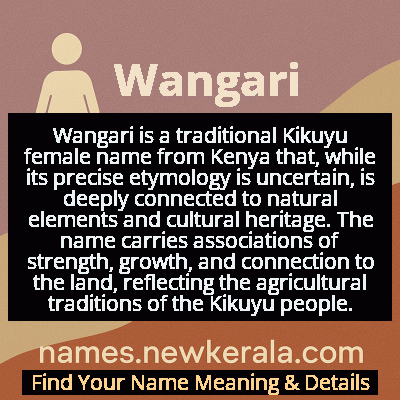Wangari Name Meaning & Details
Origin, Popularity, Numerology Analysis & Name Meaning of Wangari
Discover the origin, meaning, and cultural significance of the name WANGARI. Delve into its historical roots and explore the lasting impact it has had on communities and traditions.
Name
Wangari
Gender
Female
Origin
African
Lucky Number
1
Meaning of the Name - Wangari
Wangari is a traditional Kikuyu female name from Kenya that, while its precise etymology is uncertain, is deeply connected to natural elements and cultural heritage. The name carries associations of strength, growth, and connection to the land, reflecting the agricultural traditions of the Kikuyu people.
Wangari - Complete Numerology Analysis
Your Numerology Number
Based on Pythagorean Numerology System
Ruling Planet
Sun
Positive Nature
Leaders, ambitious, highly driven, self-reliant, innovative.
Negative Traits
Overly aggressive, domineering, impatient, selfish.
Lucky Colours
Red, orange, gold.
Lucky Days
Sunday.
Lucky Stones
Ruby, garnet.
Harmony Numbers
2, 3, 9.
Best Suited Professions
Entrepreneurs, managers, engineers.
What People Like About You
Courage, determination, leadership.
Famous People Named Wangari
Wangari Maathai
Environmentalist, Political Activist
Nobel Peace Prize laureate and founder of the Green Belt Movement
Wangari Muta
Educator, Community Leader
Pioneering teacher and women's advocate in colonial Kenya
Wangari Kabura
Cultural Preservationist
Promoter of Kikuyu traditional arts and oral histories
Name Variations & International Equivalents
Click on blue names to explore their detailed meanings. Gray names with will be available soon.
Cultural & Historical Significance
Extended Personality Analysis
Women named Wangari are typically associated with strength, resilience, and a deep connection to community and nature. They often exhibit a grounded, practical approach to life combined with visionary leadership qualities. These individuals tend to be nurturing and community-oriented, yet fiercely determined when pursuing their goals or defending their principles. The legacy of Wangari Maathai has reinforced associations of environmental consciousness, educational dedication, and social activism with this name. Wangaris are often perceived as bridge-builders who can connect traditional wisdom with contemporary challenges, demonstrating both cultural pride and innovative thinking. Their personality is marked by a unique blend of gentle strength and unwavering commitment to making positive change in their communities and beyond.
Modern Usage & Popularity
In contemporary society, Wangari maintains strong cultural relevance while adapting to modern contexts. The name has seen increased usage among Kenyan families, both in the homeland and diaspora, as a way to honor cultural heritage and the inspirational legacy of Wangari Maathai. Urban professionals often choose the name to connect their children with traditional values while embracing global citizenship. While the name remains most popular within Kikuyu communities, its association with environmental activism has given it broader appeal among families interested in ecological values. Modern usage typically preserves the name's traditional pronunciation and spelling, though it may be paired with more contemporary middle names. The name continues to symbolize pride in African heritage while representing progressive values of sustainability and gender equality.
Symbolic & Spiritual Meanings
Symbolically, Wangari represents the enduring connection between humanity and the natural world, embodying the principles of growth, sustainability, and community resilience. The name has become a metaphor for grassroots power and the ability of determined individuals to create widespread change. Through Wangari Maathai's legacy, it symbolizes the idea that caring for the environment is intrinsically linked to peace, democracy, and human rights. The name carries connotations of rootedness and stability, like a deeply anchored tree that withstands storms while providing shelter and nourishment. It also represents the cyclical nature of life and the importance of planting seeds—both literal and metaphorical—for future generations. Wangari has evolved into a powerful symbol of African women's leadership and the global environmental movement.

